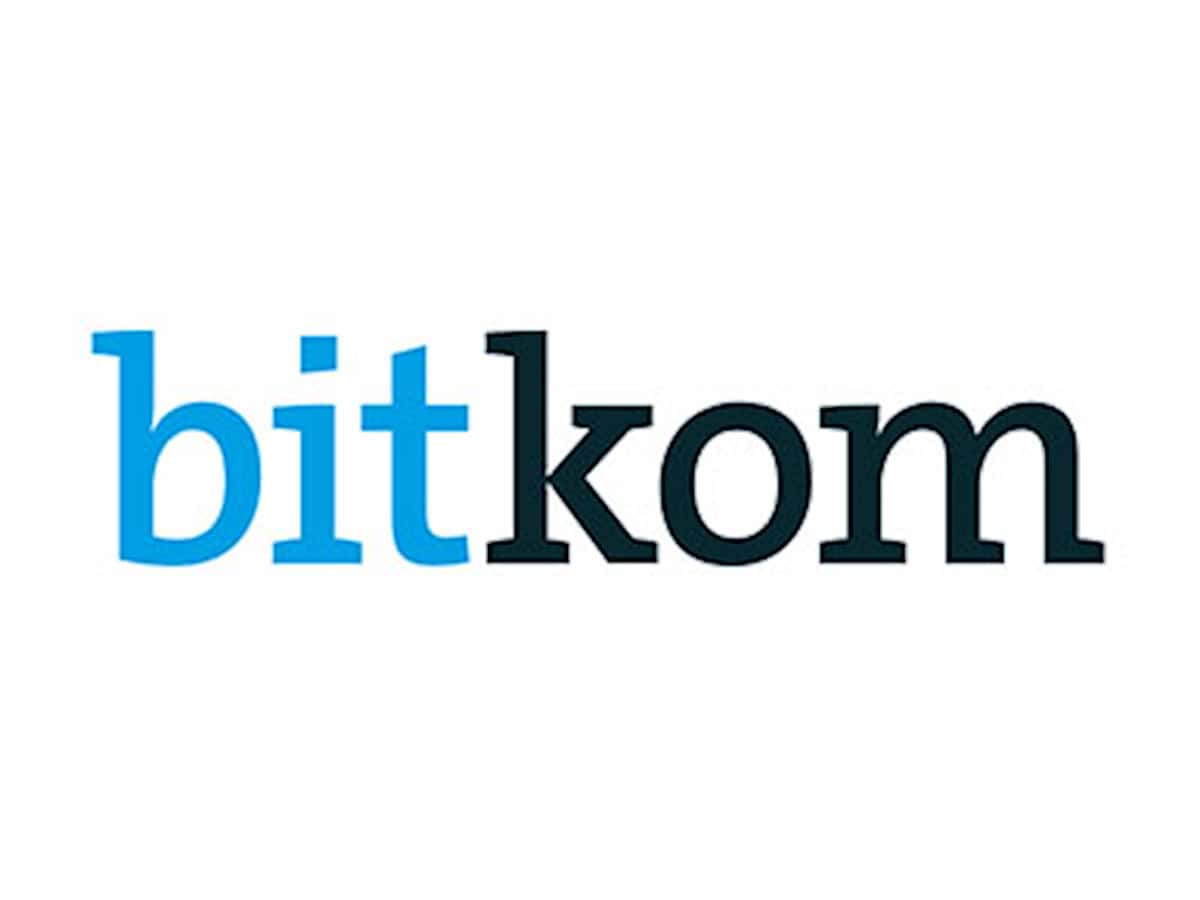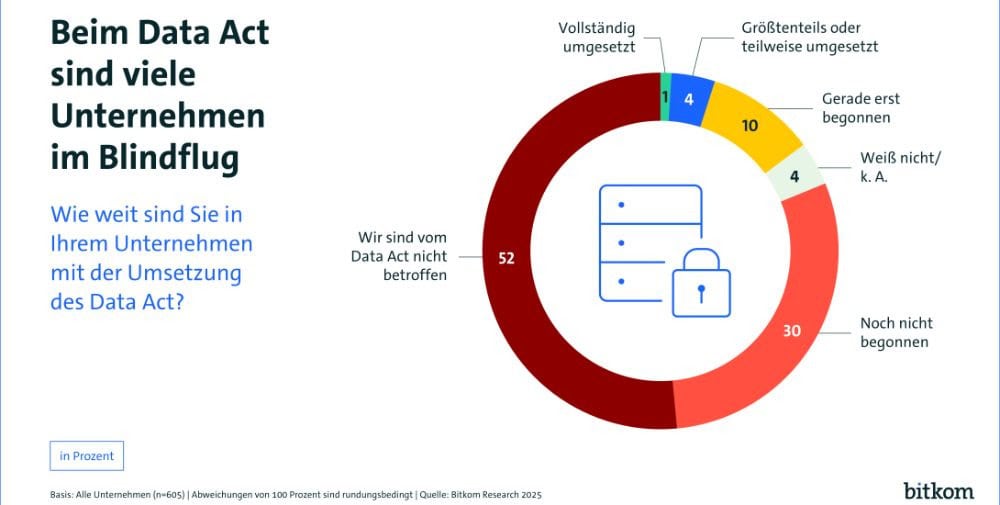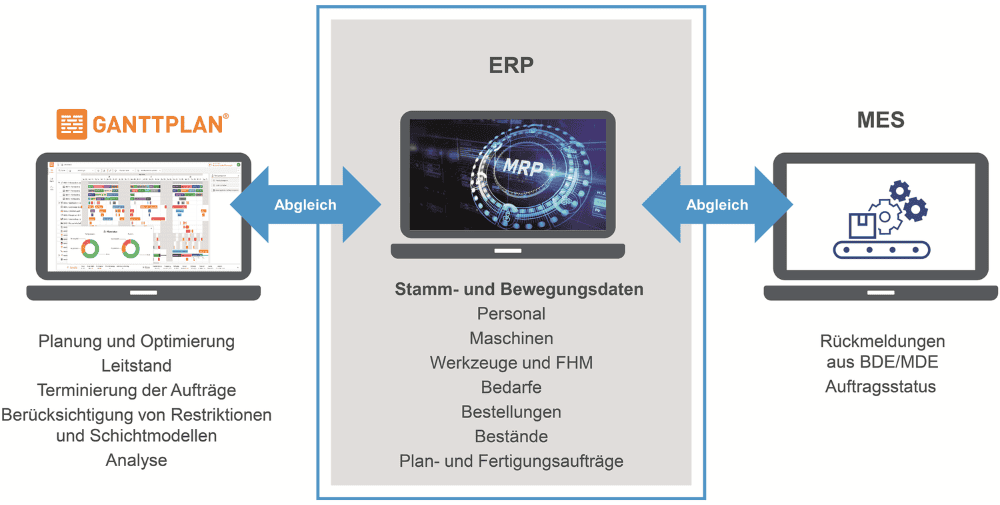
“The Data Act affects almost every company, but most of them haven’t even seriously considered it yet,” says Bitkom President Dr. Ralf Wintergerst. “The Data Act must not repeat the drama of the General Data Protection Regulation. The GDPR has become a real obstacle to innovation due to years of uncertainty and implementation difficulties. Management must wake up now and politicians must provide better support.” This is also important because the German economy wants to significantly expand the use of data. While data-driven business models currently only contribute exclusively or significantly to business success in around a quarter (27%) of companies, this figure is set to rise to 47% in just two years’ time. “The German economy is sitting on a treasure trove of data – and more and more companies are setting out to exploit it,” says Wintergerst. At the same time, 12% of companies feel that they have missed the boat when it comes to data-driven business models, compared to 19% a year ago. 8 percent have not yet addressed the topic at all, compared to 15 percent in the previous year.
Implementation of the Data Act causes high costs
The EU Data Act was adopted in November 2023 and will become applicable from September 12, 2025 after a transition period. It contains a large number of different regulations that are intended to make it easier to switch cloud providers, for example. However, it also sets out requirements for contractual clauses relating to data and, above all, gives users and third parties rights to data from networked devices.
The implementation of the Data Act creates a lot of work for most companies and blocks resources, for example for the development of innovations. Those companies that see themselves affected by the Data Act or are already in the process of implementing it complain overwhelmingly about the high costs. 32% speak of a very high implementation effort, 34% of a rather high one. Three quarters (75 percent) of these companies say that the implementation of the Data Act means there is no time for innovation. 9 out of 10 (90 percent) feel overwhelmed by the many new laws and requirements. And 90 percent also call for more advice from public authorities when implementing the Data Act. “Not only companies, but also politicians need to do their homework when it comes to the Data Act. Whoever decides on regulation must also provide those affected with sufficient information and support. In one and a half years, the last federal government did not even manage to appoint the authority that is to oversee the implementation of the Data Act,” says Wintergerst. “The new government must make up for this immediately. Data is crucial for business success in many areas, whether in the training and use of AI, in medical technology or in the automotive industry.”
Data economy: majority still see Germany as a latecomer
Two thirds (67%) of companies expect data-driven business models to play a major role in the growth and prosperity of national economies in the future. However, only 6 percent currently see the German economy as one of the pioneers here, 34 percent in the midfield and 51 percent among the laggards. 6 percent even believe that Germany has missed the boat. The USA (32%) and China (28%) are considered to be the leaders. They are followed at a considerable distance by Japan (12%) and South Korea (7%). “As the world’s third-largest economy, our ambition must be to also occupy a leading position in the data economy,” says Wintergerst.
Only 7% of companies fully exploit the potential of the data already available to them, while a further 30% use it at least to some extent. Conversely, 41 percent say that they make little use of the opportunities, while 19 percent do not use them at all. Of these, however, 26 percent have already taken measures to make better use of data in the future, and a further 49 percent are currently planning to do so.
Data business is set to boom
The data business is expected to expand massively in Germany in the coming years. Today, 41 percent of companies are already active on data markets as data buyers, while 16 percent offer data there. However, a further 34% want to obtain data from data markets in the future and 43% want to offer data. The number of data consumers could therefore rise to 75 percent and the number of data providers to 59 percent in the future. “In a few years, every second company in Germany will provide its own data,” says Wintergerst. While 54 percent of companies are still not active on data marketplaces today, only 17 percent currently rule this out with a view to the future.
Companies that do not offer data are, according to their own statements, deterred from doing so by data protection. In their case, it does not allow data exchange, say 56 percent. 42 percent are unsure whether data sharing is legally possible, while 31 percent are concerned that trade secrets could be inadvertently passed on. For 28 percent, the data is not compatible and 24 percent are concerned that other countries will use the data provided against us. 19 percent have difficulties in reaching agreements with potential partners, for 16 percent the data offering is not economically attractive and 13 percent do not want to strengthen competitors. 12% simply do not know any suitable customers. “A data economy needs legal certainty and regulation that actively promotes data-driven business models,” says Wintergerst.
Famous data rooms include Catena-X in the automotive sector and Manufacturing-X for the industrial supply chain. However, such data rooms are currently only used by 9% of companies, with a further 18% planning to do so and 22% discussing it. For a third (33%), data rooms are not an issue, while 15% have not yet heard of them. Almost half (46%, 2024: 39%) say that data rooms open up completely new business opportunities for their company. 58% assume that data rooms will promote the use of artificial intelligence (2024: 49%). At the same time, 47% (2024: 42%) complain that data rooms are still too complicated for companies to use. 49% would like politicians to promote data rooms more (2024: 55%). In contrast, around a third (37%, 2024: 32%) consider data rooms to be irrelevant for their own business model, while 23% (2024: 22%) see data rooms as a threat to their own business model.
Companies obtain a wide range of data – and need even more
Many companies are already accessing data provided by third parties. For example, 76 percent use market data obtained in this way, 66 percent customer and contact data. This is followed by geodata (46 percent) and data from the areas of administration (39 percent), finance and business as well as mobility (38 percent each), social media (28 percent), technology (27 percent), environmental and weather (26 percent), machines (24 percent) and health (5 percent). If companies are asked which data they lack, social media data comes out on top (39 percent), followed by administrative data (27 percent), customer and contact data (25 percent), financial and economic data (24 percent), technology data (22 percent), geodata (19 percent), environmental and weather data as well as machine data (18 percent each), health data (14 percent), market data (13 percent) and mobility data (12 percent). “We need functioning data marketplaces so that companies can obtain the data they need,” says Wintergerst. “The public sector is also called upon to make data available. The responsible use of data creates economic and social added value that we cannot do without.”
Note on methodology
The data is based on a survey conducted by Bitkom Research on behalf of the digital association Bitkom. This involved a telephone survey of 605 companies in Germany with 20 or more employees. The survey took place in the period from week 10 to week 16 2025. The survey is representative.
– – – – – –
Further links
👉 www.bitkom.org
Graphic: Bitkom




